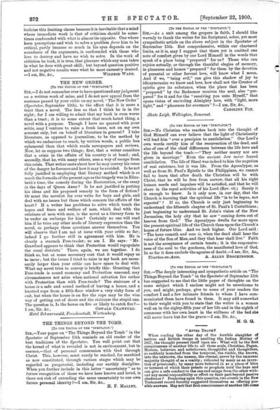[To THE EDITOR OF THE "SFECTATOR.1 Snt,—No Christian who reaches
back into the thought of God Himself can ever believe that the light of Christianity will lead him "over a precipice to annihilation." Our Lord's own words certify him of the resurrection of the dead, and also of one of the chief differences between the life here and the life beyond the tomb:—" They neither marry nor are given in marriage." Even the ancient Jew never feared Famihilation. The life of Sheol was indeed to him the negation of real existence, but it was life. From the Apocalypse, as well as from St. Paul's Epistle to the Philippians, we cannot fail to learn that after death the Christian will be with Christ, that he will be free from sorrow, that all his right human needs and impulses will be satisfied, and that he will share in the royal activities of his Lord (Rev. vii.) Surely it is enough to know. Is it only now, in our day, that the Church is learning that the spiritual life "is to be begun, not expected" ? If so, the Church is only just beginning to understand the fifteenth chapter of St. Paul's 1 Corinthians; just beginning to understand St John's vision of the New Jerusalem, the holy city that he saw "coming down out of heaven from God." The Apocalypse dwells far more upon the present spiritual life of the Church than upon the Church's hopes of future bliss. And we look higher. Our Lord said : "The hour comoth and now is, when the dead shall hear the voice of the Son of Man, and they that hear shall live." Faith is not the acceptance of certain tenets ; it is the responsive- ness of the soul to the goodness, the manifested love of God. In so far it does exclude the agonies of doubt. —I am, Sir, &o.,






































 Previous page
Previous page